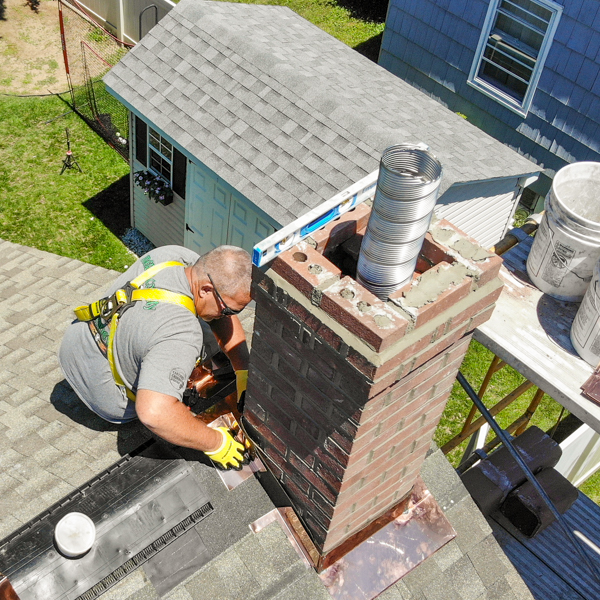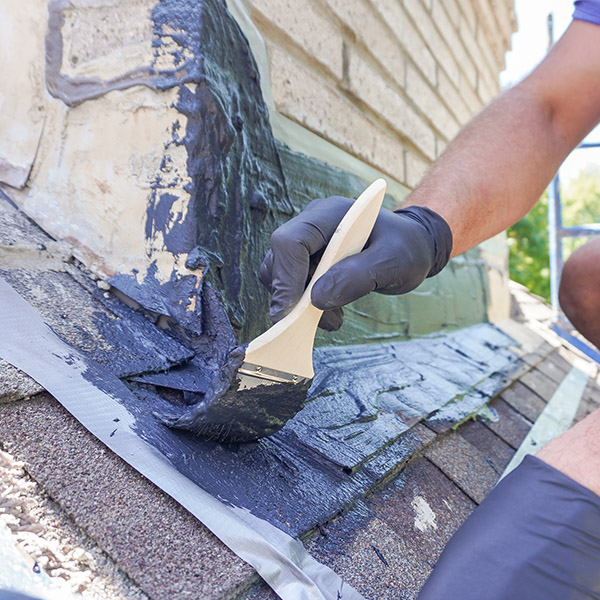Why is Chimney Flashing Important
Your chimney may seem simple, but it’s made up of many parts. If one of those parts gets damaged, it can affect the entire system and put your home and family at risk. In this post, we look specifically at chimney flashing, what it is, why it’s so important, and how to prevent damage.
 What is Chimney Flashing?
What is Chimney Flashing?
Sometimes called roof flashing, chimney flashing is metal material installed at the point your chimney contacts the roof. Flashing creates a barrier to stop water from seeping in. When installed correctly, chimney flashing can last up to 30 years; however, if the builder or contractor used inferior materials or construction, it can spell trouble right off the bat.
Common Flashing Materials
As mentioned, flashing is typically metal, and here are the most common metals used and their advantages.
- Steel- is one of the most popular flashing materials because it’s strong.
- Aluminum- is also commonly used because it’s inexpensive and corrosion-resistant.
- Copper- is pricier than aluminum or steel, but many homeowners prefer it because it won’t rust and looks more attractive.
- Vinyl- is best suited for warm weather climates because it will crack in harsh winter weather. Many contractors prefer vinyl because it’s easier to work with than metal.
Why is Chimney Flashing Important?
Chimney flashing is crucial because it prevents water leaks and moisture damage. Many people are diligent about chimney sweeping and tuckpointing but don’t pay attention to the flashing, which can wear out or suffer damage from harsh weather.
Signs of Damaged Flashing
Unless you’re usually getting up on the roof for regular inspection, detecting flashing damage can be challenging. However, there are signs to watch for.
Water in the Attic
Check the attic for signs of water damage, like spots or mold. If the flashing leaks, the water goes first into the roof.
Brick Damage
Besides preventing water from seeping into the house, flashing protects the chimney’s bricks. Water is your chimney’s number one enemy because the masonry absorbs it like a sponge. Once water gets in, it expands during the freeze/thaw cycle, causing cracks. As time goes on, the cracks worsen and can compromise your chimney’s structure.
Repairing & Preventing Chimney Leaks
As mentioned, chimney leaks can cause significant damage, requiring thousands of dollars of repairs, so you must fix leaks as soon as possible and take precautions to prevent them. According to the Chimney Safety Institute of America (CSIA), If you have a chimney leak, the first step is to call a CSIA-Certified Chimney Sweep. A certified chimney sweep will perform a top-to-bottom inspection for signs of water damage. Professional chimney sweeps are trained to detect water leaks and their cause. Besides calling a pro if you detect a leak, take the following steps to prevent water damage.
Maintain the Crown or Chase Cover
Your chimney should have a crown, a concrete slab sitting at the top to direct water away from the chimney. If you have a factory-built chimney, you probably have a chase cover to protect it. Regardless of which, it’s essential to keep these components well-maintained by scheduling annual inspections and damage repairs.
Install a Chimney Cap
Many homeowners don’t think they need a chimney cap, but they’re essential to protect against leaks and water damage. Chimney caps stop rainwater from going down the flue, where it can penetrate the brickwork. Installing a chimney cap is an inexpensive way to prevent leaks and chimney damage.
Keep Your Flashing Watertight
Because flashing is the first line of defense against water leaks, it’s essential to keep it in good condition and ensure it’s watertight. As mentioned, the best way to do this is to schedule annual inspections from a trained professional.

Repair Damaged Bricks & Mortar Joints
Mortar joints shouldn’t have gaps or holes where water can get in. It’s common for mortar and bricks to deteriorate in extreme weather climates.
The most common repair for damaged mortar is tuckpointing or repointing. Tuckpointing performed by masonry experts keeps your chimney in good condition, extends its lifespan, and prevents expensive repairs down the road.
Call Mercer County Chimney Service
Mercer County Chimney Service is the company Mercer County residents trust for all their chimney and fireplace needs. Why? Because our technicians are fully certified, licensed, and insured. Contact us today at 609-802-5288.


